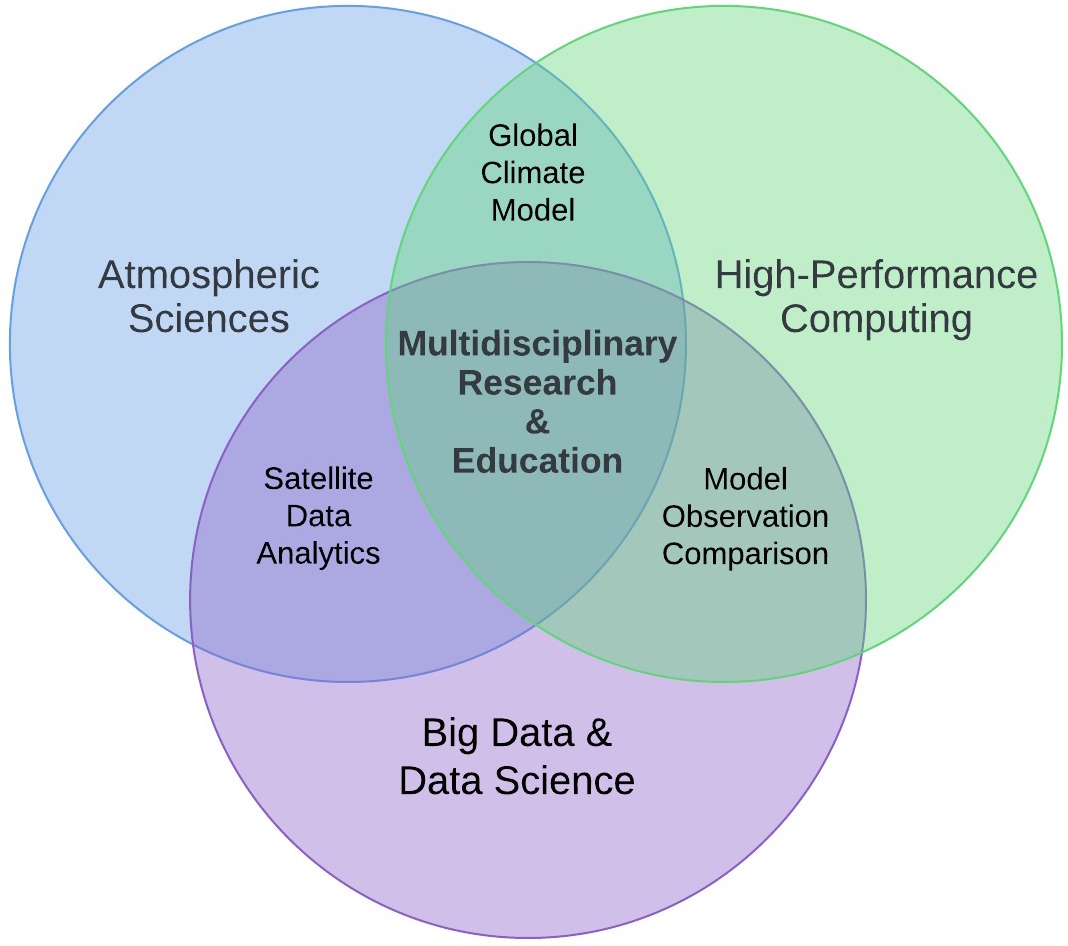Multidisciplinary Research and Education on Big Data + High-Performance Computing + Atmospheric Sciences
Part of NSF Initiative on Workforce Development for Cyberinfrastructure (CyberTraining)
This website is about a new NSF-funded initiative in big data applied
to atmospheric sciences and using high-performance computing as a vital tool. The
training consists of instruction in the areas of data, computing, and atmospheric
sciences supported by teaching assistants, followed by faculty-guided project research
in a multidisciplinary team of participants from each area. Participating graduate
students, post-docs, and junior faculty from around the nation will be exposed to
multidisciplinary research experiences and have the opportunity for significant career
growth.

News
 2021/2, we are excited to receive another NSF grant to continue our interdisciplinary undergraduate research training via the NSF REU (Research Experience for Undergraduates) Site program. The new REU Site at UMBC is called Online Interdisciplinary Big Data Analytics in Science and Engineering. This Big Data REU program is funded by NSF in 2021 to conduct undergraduate research training in 2021-2023 (pending final funding approval).
More information can be found at the Big Data REU web site.
2021/2, we are excited to receive another NSF grant to continue our interdisciplinary undergraduate research training via the NSF REU (Research Experience for Undergraduates) Site program. The new REU Site at UMBC is called Online Interdisciplinary Big Data Analytics in Science and Engineering. This Big Data REU program is funded by NSF in 2021 to conduct undergraduate research training in 2021-2023 (pending final funding approval).
More information can be found at the Big Data REU web site.
 2020/12, the extended version of CyberTraining 2020 team 7's technical report, titled "Image Segmentation for Dust Detection using Semi-supervised Machine Learning", is accepted by
the 2020 IEEE International Conference on Big Data (BigData 2020).
2020/12, the extended version of CyberTraining 2020 team 7's technical report, titled "Image Segmentation for Dust Detection using Semi-supervised Machine Learning", is accepted by
the 2020 IEEE International Conference on Big Data (BigData 2020).
 2020/10, our TA Pei Guo's conference paper from this project received the Best Student Paper
Award! Detailed info: Pei Guo, Achuna Ofonedu, Jianwu Wang. Scalable and Hybrid Ensemble-Based Causality Discovery. Accepted by the 2020 IEEE International Conference on Smart Data Services (SMDS 2020), IEEE, 2020.
2020/10, our TA Pei Guo's conference paper from this project received the Best Student Paper
Award! Detailed info: Pei Guo, Achuna Ofonedu, Jianwu Wang. Scalable and Hybrid Ensemble-Based Causality Discovery. Accepted by the 2020 IEEE International Conference on Smart Data Services (SMDS 2020), IEEE, 2020.
 2020/7, our instructor Dr. Gobbert gave a presentation at the 16th International Conference
on Frontiers in Education: Computer Science & Computer Engineering (FECS'20). Presentation video.
2020/7, our instructor Dr. Gobbert gave a presentation at the 16th International Conference
on Frontiers in Education: Computer Science & Computer Engineering (FECS'20). Presentation video.
2020/4, our TA Jianyu ("Kevin") Zheng is selected for the Outstanding Student Presentation
Award
(OSPA) by the American Geophysical Union (AGU). His presentation title is "A New Retrieval
Algorithm of the Thermal Infrared Optical Depth of Dust based on the Combined CALIOP and IIR
Observations”.
2020/4, the extended version of CyberTraining 2019 team 4's technical report, titled "A
Method for Mineral Dust
Detection and Feature Selection with Deep Learning", is accepted by
6th IEEE International Conference on Smart Computing
(SMARTCOMP 2020).
2019/9, the extended version of CyberTraining 2018 team 4's technical report is accepted by Frontiers in Earth Science, Frontiers, 2019. Hybrid Causality Analysis of ENSO's Global Impacts on Climate Variables based on Data-driven Analytics and Climate Model Simulation.
2019/8, the extended version of CyberTraining 2018 team 3’s technical report has published:
Peichang Shi, Qianqian Song, Janita Patwardhan, Zhibo Zhang, Jianwu Wang, and Aryya
Gangopadhyay. A hybrid algorithm for mineral dust detection using satellite data. Proceedings of
the 15th IEEE International Conference on e-Science
(e-Science2019).
2019/5, congratulations to Pei Guo on receiving fellowship from UMBC Joint Center for Earth
Systems Technology on causality analytics. More info is at JCET website.
Acknowledgement
The project is funded by the grant CyberTraining: DSE:
Cross-Training of Researchers in
Computing, Applied Mathematics and Atmospheric Sciences using Advanced Cyberinfrastructure
Resources from the National Science Foundation (grant no. OAC-1730250).
Citation
Please cite our training program: Jianwu Wang, Matthias Gobbert, Zhibo Zhang, Aryya
Gangopadhyay, Glenn Page. Multidisciplinary Education on Big Data + HPC + Atmospheric Sciences,
In Proceedings of the Workshop on Education for High-Performance Computing (EduHPC-17) at
SC'2017.


